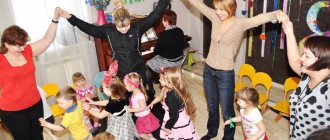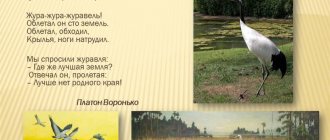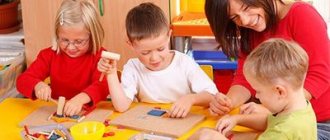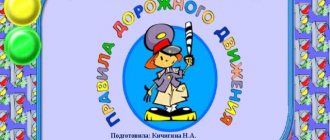MAGAZINE Preschooler.RF
Methodological development of the “Victory Day” project for children of senior preschool age.Project type:
- by dominant type of project activity: information and creative
- by implementation period: short-term
- by content: integrative (educational areas: social and communicative development; cognitive development; speech development; artistic * aesthetic development; physical development).
Project participants:
- children of the older group;
- teachers;
- parents of pupils
Security:
Logistics:
Slides “The Great Patriotic War” , family photographs of the war years, photo album, cardboard, glue, colored paper (for making memorial cards), camera, tape recorder, military uniform, front triangles (letters), presentations.
Project implementation period: 2 months
Problem situation: Artem brought a book about the war, about victory. We decided to find out in more detail - children of preschool age are poorly oriented in the history of our country, they have not formed such concepts as veterans, defense, invaders, fascists. Children do not know enough about the Great Patriotic War, about the exploits, about the heroism of people in those terrible years, about the cost of the victory of the Soviet people over the Nazis. The problem of cultivating interest in the history of one’s homeland is one of the priority areas of patriotic education.
Relevance:
Victory Day is the most touching, patriotic holiday. This is a day of remembrance and honor. This date is moving further and further away from us - May 9, 1945. The task of teachers is to ensure that our children are imbued with that time, those impressions and experiences.
On the eve of the celebration of Victory Day, a blitz survey was conducted with children to identify knowledge and ideas about the Second World War, which showed that children have very little knowledge about the heroes of the Great Patriotic War. They have no idea about the reasons for the holiday. There is mutual estrangement between children and parents, a severance of warm emotional ties between the older and younger generations. Objective indicators of moral ill-being in childhood are: the manifestation of computer addiction, including violent games. Unfortunately, the younger generation is forgetting Russian folk culture, folk games, and with the “help of television” new heroic images are being formed. In this regard, the problem of moral and patriotic education of preschool children becomes one of the most pressing. Thus, it was decided to develop and implement the project “Great holiday - Victory Day” .
Objective of the project:
Instilling patriotism in older preschoolers, a sense of pride in the feat of our people in the Great Patriotic War.
Project objectives:
Cognitive development
- To give an idea of the significance of the victory of our people in the Great Patriotic War; introduce historical facts of the war years;
- Expand and systematize children’s knowledge about the Great Patriotic War.
- Enrich the spiritual world of children through reference to the heroic past of our country.
- Introduce children to the exploits of heroes - schoolchildren.
- To consolidate children's knowledge about the branches of the military and their purpose.
Speech development
- Enrich and develop children's vocabulary by deepening their understanding of the events of the Great Patriotic War of 1941-1945.
- To enrich the musical and auditory experience of children in the process of perceiving songs of the war years.
- Introduce works of fiction and music of the war years.
Develop the ability to express one’s point of view and competently justify the answer.
Physical development
- Teach construction, orientation in space;
- Learn to crawl, climb, throw;
- To develop in children the ability to walk and run easily and rhythmically, maintaining the coordination of movements of the arms and legs.
- Develop psychophysical properties (speed, endurance, agility).
Artistic and aesthetic development
Introduce the symbols of the Second World War.
Encourage children to independently depict their impressions in drawings, using the knowledge and skills they have acquired.
Form an emotional response to a piece of music, attention to the topic.
Social and communicative development
Maintain a reverent attitude towards the Victory Day, respect for the merits and exploits of the soldiers of the Great Patriotic War.
To instill patriotic feelings in children: love for the Motherland, respect for the older generation, for the history of their country.
Foster respect for the memory of victorious soldiers.
To instill in children a caring attitude towards family photographs and awards, and a respectful attitude towards the older generation.
Expected result:
Expanding children's ideas about the exploits of the Soviet people, about the defenders of the fatherland and the heroes of the Great Patriotic War;
Showing a sense of pride in the perseverance and dedication of the Soviet people during the Great Patriotic War;
Formation of an attentive and respectful attitude among preschoolers towards veterans and elderly people, a desire to provide them with all possible assistance.
The ability to present a creative search product of individual and collective activity
Main methods and techniques of the project:
Classes, conversations and questions, problem situations, reading and studying fiction, viewing demonstration material, online materials on the topic of the project, didactic and verbal games, physical education and outdoor games.
Final event:
Thematic leisure time “For children about the war” with the participation of children from the group.
Laying flowers at the grave of liberating soldiers.
Project implementation stages
Stage 1
- Identification of children's initial knowledge about the war and the victory holiday.
- Information for parents about the upcoming project.
- Selection of literature, presentations, photographs, posters.
- Including the topic of conversations and classes in calendar and thematic planning.
- Preparation of presentations and musical works.
- Together with your parents, select material about relatives who participated in the Second World War. Design of an exhibition of drawings and posters made by parents together with their children.
- Consultation with parents on the topic: “Victory Day” .
Stage 2
- Conducting educational activities and conversations about the Second World War.
- Involving parents to participate in the project.
- Organization of plot-role-playing, didactic and outdoor games.
Stage 3 Final
- Organization of an exhibition of works for Victory Day (joint work of children and parents).
- Laying flowers at memorial places.
- Literary and musical leisure "May 9" .
Final result: teachers are satisfied with the work done and the results of the project. All material on the project topic has been collected and systematized. All assigned tasks were successfully completed, children and parents took an active part in the implementation of the project.
Project implementation model:
Cognitive development
Conversations
“The History of the St. George Ribbon - Tie. If you remember!
"This Victory Day"
"What is heroism?"
"Children of war"
"Military equipment of the Second World War"
Conversations using illustrations
- “Let us bow to those fallen soldiers...”
- "The Soldier is the Winner"
- "What is heroism?"
- "About heroic cities"
- “Moscow is a hero city” NOD
- viewing posters “The Motherland is Calling!” THEM. Toidze, “Letter from the Front” by A. Laktionov
- looking at illustrations, books, photographs about the war
Classes:
- "They fought for their homeland"
- "Hero Cities"
- "Hero Children"
- “What are they, orders?”
- "This Victory Day"
- Meeting with a WWII veteran
- Speech development
- Memorizing and reading poems about war, soldiers, veterans.
- Guessing military themed riddles
- Reading proverbs and sayings about courage.
Reading fiction:
- E. Blagina “The Overcoat” ;
- reading chapters from S. Baruzdin’s book “A Soldier Walked Down the Street” ;
- N. Dilaktorskaya “Why was mom nicknamed Grishka” ;
- A. Mityaev “Dugout” ; "Bag of Oatmeal" ; “Why is the army dear?”
- L. Cassil from the book “Your Defenders” .
- telling military-themed riddles
Artistic and aesthetic development
Music
Listening to music: “Holy War” ,
"Victory Day",
learning songs and dance movements;
— musical lesson “Acquaintance with songs of the war years .
Visual activities
Drawing:
- "Festive fireworks"
- "War"
Modeling
- "Border Guard with a Dog"
- "Tanks"
Application
- Postcard for May 9
Manual labor:
- Paper craft “Dove of Peace”
Construction
- "Warship"
- Social and communicative development
Didactic games:
- "Pick a picture".
- “A soldier has his own weapon”.
- "Wheel of History".
- “How our great-grandfathers defended the world”
- "Great People of Russia"
- "Before and Now"
- "Name the proverb"
- "Make a map"
- "Whose Shape".
- "Defenders of the Fatherland"
- "Military transport".
- "What does an artilleryman need"
- “Who will I serve in the Army?”
- "Guess the military profession"
- "Find the flag"
- “Find out the coat of arms of our country”
Role-playing games:
- "Our Army"
- "Sailors"
- "Scouts"
- "Infantrymen"
- "On the border"
- "Pilots".
- "Border Guards"
Physical development
Outdoor games
- "School of a Young Fighter";
- "Intelligence service."
- "Counter dashes"
- "Hit the target"
- "Accurate shooter".
- "Bombers"
- "Ladder"
- "Collect ammo"
Working with parents
Stand design “Glory to you, conquering soldier”
Consultation for parents on the topic: “Introduce children to the heroic past of Russia”
Design of the moving folder “May 9” .
Involving parents in holding an exhibition of drawings, theme: “War through the eyes of children”
Bibliography:
- A. N. Davidchuk “constructive creativity of a preschooler” A manual for educators. M., Enlightenment" 1973.
- I. E. Averina" Physical education minutes and dynamic pauses in preschool educational institutions: practical work. allowance/2006. -144s. (Preschool development).
- Veraksa N. E. Project activities of preschool children: a manual for teachers of preschool institutions / N. E. Veraksa, A. N. Veraksa. – M.: MOSAIKA-SYNTHESIS publishing house, 2008. – 112 p.
- O. V. Dybina “Familiarization with objects and social environment . Senior group.-M.: Mozaika-Sintez, 2015. -80 p.
- I. A. Lykova “Art activities in kindergarten”
- Nechaeva V. G., Makarova T. A. Moral education in kindergarten [text]: for teachers of preschool institutions / V. G. Nechaeva, T. A. Makrova - M.: Education, 1984. - 272 p.
- Comprehensive classes according to the program edited by M.A. Vasilyeva, V.V. Gerbova, T.S. Komarova.
- Aleshina N.V. Patriotic education of preschool children: methodological recommendations / N.V. Aleshina. – M.: TsGL, 2005. – 205 p.
- Kondrykinskaya L. A. Preschoolers about the defenders of the Fatherland: a methodological guide to patriotic education in preschool educational institutions. L. A. Kondrykinskaya. – M.: TC Sfera, 2006. – 192 p.
- -A. P. Kazakova, T. A. Shorygina “To children about the Great Victory” Moscow 2010 T. A. Shorygina “Victory Day” Moscow 2010
Internet resources
- Presentations “The Great Patriotic War” , “Children of War” , “Military Equipment”
| Next > |




